11 Eco-Friendly Yoga Mats For That Sustainable Stretch
Sustainability is just as important as stretching—especially when both human health and the health of the planet are at risk.
That’s where eco-friendly yoga mats come in.
Most yoga mats are made of PVC, which poses (pun intended) a health risk to any asana advocate. It exposes you to carcinogenic dioxins and heavy metals, not to mention its heavy carbon footprint.
We don’t know about you, but that makes us feel pretty anti-zen.
Hot yoga ✔️; Hot planet ❌
Stand tall and take a deep, grounding breath in because we’re on the hunt for the best sustainable yoga mats.
Everything we recommend to you on Sustainable Jungle is independently researched and we ask all brands to confirm their claims. To avoid waste, we test products on an as needed basis. This post contains affiliate links. If you buy something through our links, we may earn a small commission. Learn more about why we do this here.
The Most Eco-Friendly Yoga Mats For Those (Eco) Warrior Poses
For artistic inspiration whilst doing your asanas, each stunning sustainable yoga mat from Scoria is also naturally antimicrobial thanks to the sustainably-harvested cork yoga mat material.
If you’re looking to shop eco-friendly yoga mats from a wide variety of brands, Mukha Yoga has all the selection you need for a planet-friendly flow—from cork mats to natural tree rubber ones.
Or practice your toxin-free tree pose on a non-stick eco-friendly yoga mat from Complete Unity Yoga.
Now get your ujjayi breath going, limber up in your favorite eco-friendly leggings, and let’s get down-dog to business.
For more on how to choose eco-friendly yoga mats, cobra roll your way to the bottom of the article.
The Full List Of Sustainable Yoga Mat Brands
- Scoria | Visit Store
- Complete Unity Yoga | Visit Store
- Bean Products | Visit Store
- Mukha Yoga | Visit Store
- Liforme | Visit Store
- Shakti Warrior | Visit Store
- Yoga Design Lab | Visit Store
- Khali Khutta | Visit Store
- Jade Yoga | Visit Store
1. Scoria
About Scoria
Price Range: $89–$102
If you have your heart (chakra) set on a sustainable cork yoga mat, Canadian-based Scoria may just #SparkTheChildWithin.
That’s because their mats are much more than just mats; they’re also works of art.
Available in a selection of unique and beautiful designs and sizes—including eco-friendly kids yoga mats—you can pick the perfect vibe for your practice, whether it’s mushrooms or mountains.
We obviously love a good plant theme, so we went with the Blossom yoga mat and love stretching out atop the minimalist floral etchings.
The natural cork makes this eco-friendly yoga mat super cushy, so even though it’s only the standard 4.5mm thick, we think it cushions the knees and sit bones far more than other mats of the same thickness.
Plus, we love that each biodegradable yoga mat comes with a simple carrying strap included.
Complete your practice tools with their range of sustainable yoga accessories, like cork blocks and our all-time-favorite yoga wheel.
Scoria’s Ethical & Sustainability Practices
Materials:
Each eco-friendly cork yoga mat features a natural rubber grippy bottom and sustainably-harvested cork top, bonded together using heat and water-based eco adhesives.
If you’re looking for an antimicrobial and sticky yoga mat for your hot yoga practice, the natural properties of cork mean you don’t need to “fret the sweat”.
The beautiful designs are created using non-toxic water-based inks, resulting in REACH non-toxic certification.
Supply chain & labor practices:
The natural cork is sourced from Portugal and the natural rubber is from Vietnam. Assembly and manufacturing take place in China, and designs are finished in Canada.
Partners are scrutinized to ensure that working conditions and wages are ethical, fair, and safe.
Carbon commitments & green practices:
The cork is sustainably harvested from mature trees in Portugal every 9-12 years. The sustainable process allows the cork to regenerate and actually supports tree health.
Everything comes in plastic-free packaging.
Community & charitable giving:
By partnering with organizations like Feeding Children Everywhere and Right To Play, Scoria helps children everywhere gain access to things like healthy meals and life skills learning.
*Also available on EarthHero
2. Complete Unity Yoga
About Complete Unity Yoga
Price Range: $87–$99
For eco-friendly yoga mats UK (and USA—hooray for local warehouse!) readers can stretch out on, become one with Complete Unity Yoga.
Founded by two yoga teachers, they offer everything you need to practice yoga in a planet-friendly way.
Their CompleteGrip™ yoga mat is a non-slip, durable eco-friendly yoga mat that comes in two thicknesses: a standard 4mm thickness and a 2mm version, ideal for use as a sustainable travel yoga mat.
You can relax and breathe deeply with their 100% money-back guarantee that these will be the most non-slip eco-friendly yoga mats you’ve tried.
We accepted that challenge and Complete Unity won us over. The jute and natural rubber combo means it’s not only sticky on the bottom, but provides utterly unmatched grip up top, no matter how sweaty we get in hot yoga.
In addition to ethical, sustainable quality yoga mats (we can’t emphasize that last one enough), they stock props like bolsters, blocks, blankets, bags, carrying straps, and meditation cushions.
Complete Unity Yoga’s Ethical & Sustainability Practices
Materials:
CompleteGrip™ Technology comprises sustainable jute fibers mixed with sustainably-harvested natural rubber for a yoga mat that doesn’t convert to a slippery-slide halfway into downward dog.
If you’re looking for a BPA-free yoga mat that’s also plastic, PU, PE, and PVC-free, this is it.
Supply chain & labor practices:
We couldn’t find any manufacturing details for these jute and natural rubber yoga mats, so we’ll be contacting Complete Unity Yoga to find out.
Carbon commitments & green practices:
The CompleteGrip™mats are made using a zero waste manufacturing process and are packaged plastic-free using FSC-certified craft paper.
Community & charitable giving:Complete Unity Yoga donates 5% of its net profit to Helping Hands for India, a charity providing free education to children in rural India.
3. Bean Products
About Bean Products
Price Range: $25–$260
Chicago is famous for its Bean (and its thrift stores) so it’s only fitting this next brand hails from the Windy City.
Bean Products makes environmentally sustainable yoga mats, props, and bags, everything you might need for your pro-planet yoga practice.
Not everything is plastic-free, but if you’re looking for a plastic-free yoga mat, check out the Natural Cotton Yoga, available with either a conventional cotton or organic cotton core and cover.
If your favorite yoga studio is your own lounge, they can help you pad that too, with organic pillows, eco-friendly dog beds, and other sustainable home goods.
Bean Products’ Ethical & Sustainability Practices
Materials:
We already talked about their organic cotton yoga mat, but we’re also hoping for the OMphibian mats, featuring a wet or dry grip (for hot yoga, of course) PU surface with a natural rubber core.
Other recyclable yoga mats are made of a phthalate-free, recyclable TPE, or a blend of natural and synthetic rubber.
Bean Products does have a PVC mat that is SGS-tested as free of toxic phthalates, dioxins, furans, phenol, and heavy metals, but we always urge you to opt for PVC-free yoga mats (more on that below).
Supply chain & labor practices:
As an eco-friendly yoga mat USA brand, Bean Products’ manufacturing is in the United States, which is also where some of the hemp used in their props is grown.
Carbon commitments & green practices:
Bean takes pre-consumer furniture scraps and post-consumer recycled polystyrene to stuff their bean bag chairs.
Be sure to opt in to their carbon-neutral shipping.
Community & charitable giving:
For every product made, Bean plants one tree through Trees for the Future.
They also donate to The Hemp Foundation, which funds hemp fabric research and supports farming families in Uttarakhand, India.
4. Mukha Yoga
About Mukha Yoga
Price Range: $30–$190
We think the advice from this brand’s founder is pretty sound: Do Yoga, Save the Planet.
Mukha Yoga is your one-stop shop for a variety of brands making natural and/or recycled yoga mats, sustainable yoga clothes, props, and accessories.
If you want to find and compare mats from the likes of Hugger Mugger, Jade Yoga (the mat we personally tried from Mukha), Alo, and more, this female-founded yoga e-emporium is the place to go.
Mukha Yoga’s Ethical & Sustainability Practices
Materials:
Given the sheer number of mats from a variety of brands, you’ll find many different materials.
Their best eco-friendly yoga mats are those by Bennd Yoga—like the Harda & Turmeric Ayurvedic Yoga Mat—made of ethically sourced raw cotton that is medicinally dyed and blended with herbal formulas.
Unfortunately, alongside plenty of eco yoga mat materials like natural rubber, cork, and natural jute, you will find a few mats that are made of PVC.
Even though Mukha’s own Flow mat is made of SGS certified “Eco-PVC” we would still recommend sticking to one of their non-PVC yoga mat options.
You won’t find a recycled rubber yoga mat, but you will find natural rubber options with a microfiber top made of recycled plastic bottles.
Supply chain & labor practices:
Each sustainable yoga mat brand is handpicked for quality and ethics, but we’re not sure where Mukha’s in-house line is manufactured and will be reaching out to inquire.
Carbon commitments & green practices:
Most partner brands are based on the West Coast, which helps keep their supply chain localized.
While they already ship plastic-free, Mukha Yoga joins one of its brands, prAna, in the Responsible Packaging Movement’s mission to eliminate excess packaging waste from its supply chain.
Community & charitable giving:
Inner peace and enlightenment should be accessible to everyone, which is why they provide a huge range of free community resources, like guided meditations and yoga pose guides.
Mukha also sponsors tree-planting campaigns.
5. Liforme
About Liforme
Price Range: $49–$155
XL mats, travel mats, yoga pads
Those like the Cosmic Moon Mat aren’t just printed in non-toxic inks, but feature an alignment system designed to work for all bodies and styles of practice.
Each one comes with a complimentary yoga mat bag.
Liforme’s Ethical & Sustainability Practices
Materials:
Liforme’s unique yoga mats feature a natural rubber base and eco-polyurethane top surface.
This patented three-layer construction features CleanGrip® Technology, which stops sweat making its way into the natural rubber base.
They’re PVC-free and the brand claims they’ll biodegrade in 1–5 years in normal landfill conditions.
Supply chain & labor practices:
As a Certified B Corp, Liforme is audited for their social performance across their supply chain.
That said, we would still like to know where their products are made and will be reaching out for details.
Carbon commitments & green practices:
By offsetting their shipping and planting additional trees (totaling over 300,000!)Liforme aims to keep their carbon footprint as small as possible.
From factories to distribution warehouses, they ship 99% of goods by sea to reduce it further.
Community & charitable giving:
Liforme’s Live For More Foundation has given back more than $750,000 to various charity partners—like the World Wildlife Fund, GLAAD (an LGBTQ media advocacy organization), Yoga Gives Back, and more.
Donations are allocated by sales of certain collections. For example, 1% of all sales from the Mother Earth Mat are donated to support the work of Friends of the Earth and five trees are planted with Tree-nation.
6. Shakti Warrior
About Shakti Warrior
Price Range: $59–$109
Women-owned and operated brand Shakti Warrior puts the “goddess” in Goddess Pose.
This mother-daughter-founded company offers everything from props, bags, and mats to eco-friendly water bottles for staying hydrated during your Bikram yoga class.
Whether you lean toward Buti bright or classic cat-cow cork with delicate drawings, these mats feature beautiful artwork printed in water-based inks to inspire your practice.
Mats like the Ajna Pro make for some of the best natural rubber yoga mats—and not just because they feature a stunning paint pattern that will surely activate your Ajna (forehead) chakra
With hyper-portable, foldable 1mm mats and fully supportive 5mm mats, they offer something for everyone.
Shakti Warrior’s Ethical & Sustainability Practices
Materials:
Shakti’s mostly biodegradable yoga mats all feature a natural rubber base for grip and cushioning.
This tree rubber is either topped with hemp, cork, recycled PU leather, recycled plastic bottle microfiber suede, or a phthalate-free Eco PVC (which we’d recommend avoiding).
Most, however, are free of harmful phthalates, latex, toxic glue, silicone, PVC and chlorine
Supply chain & labor practices:
Yoga mat bags are manufactured through the Samarpan Foundation’s Institute of Learning, Culture, and Art, which provides socially disadvantaged women with tailoring skills training, high wages, and health care.
They’ve yet to answer our queries where the mats themselves are manufactured.
Carbon commitments & green practices:
These eco yoga mats are produced in a safe way that releases no toxic emissions into the atmosphere.
Be sure to recycle your old yoga mats if you want 10% off your new one. It’ll get transformed into eco-friendly flip-flops that are then distributed to communities in need.
Community & charitable giving:
Shakti Warrior is “committed to empowering women athletes” and places volunteer coaches in underfunded schools to provide children with sports opportunities.
They also plant a tree for every mat sold.
Yoga teachers can join their Teacher Tribe for discounts.
7. Yoga Design Lab
About Yoga Design Lab
Price Range: $49–$105
We’re down for that downward dog with a Yoga Design Lab’s sustainable yoga mat.
The brand was born out of a trip to Bali and a desire to turn unoriginal, mass-produced mats into something more mindful.
Fast-forward and YDL’s range of natural and recycled yoga mats help us choose products that are better for the planet and our practice.
Love some sustainable travel?
The ultra-thin 1.5mm Combo sustainable travel yoga mat is made from natural rubber and recycled PET microfiber.
Yoga Design Lab’s Ethical & Sustainability Practices
Materials:
There are five materials in YDL’s large sustainable mat range: natural cork, tree rubber, PU, TPE, and recycled PET microfiber.
Their Combo Mat consists of a recycled plastic yoga mat top layer (made with ~19 plastic bottles) and a natural tree rubber base. Its prana-popping color comes from water-based inks.
The eco-friendly cork yoga mat is made from biodegradable, antimicrobial natural cork, and natural rubber.
The Infinity Mats are made from an open-cell PU and tree rubber, and the Flow Mats are made with a TPE recyclable yoga mat material
All of these Prop 65 and REACH-certified yoga mats are free of non-biodegradable silicone and phthalates.
Supply chain & labor practices:
YDL’s products are manufactured in China by BSCI-compliant factories that promote ethical working conditions.
Carbon commitments & green practices:
By using recycled PET, YDL has diverted over 861,000 plastic bottles, and is working on switching to more sustainable packaging.
Community & charitable giving:
The Dalai Lama believed, “If every 8-year-old in the world is taught meditation, we will eliminate violence from the world within one generation.”
That’s why $1 of every purchase goes towards supporting Urban Yoga Foundation’s programs.
8. Khali Khutta
About Khali Khutta
Price Range: $90–$179
What’s the most eco-friendly yoga mat material?
We think it’s probably got to be hemp, one of our favorite sustainable fabrics.
Nepalese brand Khali Khutta agrees—and their wild hemp yoga mats are positively stunning.
Hemp canvas is extremely hard wearing and the addition of cotton in a parallel grid stitching creates a soft yet grippy surface that also helps absorb moisture.
Khali Khutta’s Ethical & Sustainability Practices
Materials:
Khali Khutta’s biodegradable yoga mats combine wild hemp-cotton canvas as the main material with a pure wild nettle fabric for the trim.
No bleach or dyes are used, and they’re dyed in small batches using natural, sustainable dyes.
Supply chain & labor practices:
Not only are their yoga mats eco-friendly, but ethical.
Khali Khutta’s products are made in Nepal, where they work with a small group of local farmers and artisans who use traditional craft skills.
Carbon commitments & green practices:
All raw materials they use are processed using age-old traditional methods, rooted in sustainability and simplicity.
Likewise, their manufacturing practices are zero waste and free of chemicals.
Community & charitable giving:
Khali Khutta is committed to supporting rural communities in Nepal and, where possible, purchase value-added products directly from these communities to support local livelihoods.
9. Jade Yoga
About Jade Yoga
Price Range: $30–$200
For their commitment to making the best natural rubber yoga mats, we’ll salute Jade Yoga as we do our sun salutations.
They were the first company to make green yoga mats, giving the slip to unsustainable elements and creating a non-slip eco-friendly mat to suit any yogi and any need.
Their Level One Yoga Mat For Beginners is an affordable eco-friendly yoga mat for a PVC-free practice.
But we personally prefer their ultra classic Harmony Mat for its simple design, ultra grippy texture, and cushy 4.5mm thickness. It’s absolutely one of the stickiest and most durable mats we’ve ever tried, so we’re confident it’ll last us years and years.
Jade Yoga’s Ethical & Sustainability Practices
Materials:
You’ll find sustainably sourced rubber in all of Jade’s mats, except the organic cotton yoga rug and the recycled sari yoga rug—perfect for those who are extra sensitive to the rubber smell.
The Mysore Yoga Rug is finished with vegetable dyes made from turmeric, cumin, and indigo.
None contain PVC, EVA, or synthetic rubber.
Supply chain & labor practices:
All Jade eco-friendly yoga mats are made in the USA.
The organic cotton rug is traditionally made in India and the recycled sari rug is made by the Local Women’s Handicrafts (LWH) in Nepal.
Carbon commitments & green practices:
Jade is operated by a former lawyer for the Environmental Protection Agency—a good indication that making the best eco yoga mat is a priority.
Not only are their mats natural, but they provide tips for properly recycling or upcycling old mats.
Community & charitable giving:
Jade Yoga plants a tree for every mat sold through Trees for the Future.
$5 from certain mat purchases are donated to causes like Breast Cancer Awareness Month, Ovarian Cancer Awareness Month, Autism Awareness Month, and the Akshaya Patra Foundation.
Their Community Partners program provides the homeless, prisoners, hospital patients, and underprivileged students with grants to try yoga.
Did you know we Have a Newsletter?
We cover the latest in sustainable living, fashion, zero waste, beauty, travel, finance and more…
Why Choose Non-Plastic Yoga Mats?
What are yoga mats made of?
Traditionally, PVC and PU (AKA types of plastic) are the most common.
We get real close to our mats during practice (like in child’s pose) so it’s important to steer clear of any toxic materials—especially PVC.
Why is choosing a non-PVC yoga mat so important?
PVC, or polyvinyl chloride, is made from petroleum and chemicals like vinyl chloride, which is known to cause cancer.
Combine this with heavy metals and phthalates (endocrine/hormone disruptors and known carcinogens) and you’ve got a pretty anti-zen recipe for most yoga mats.
Makes you want to skip yoga class, doesn’t it?
If you’re temporarily stuck with a PVC pad, fear not: cover it with a sustainable towel to reduce contact.
Plus, if you’re wondering, “Are yoga mats recyclable?”, the answer is “NO” when it comes to PVC mats.
There’s no safe way to recycle or destroy PVC, so that pretty purple PVC mat of yours will exist forever. Instead of throwing it away, try upcycling—outside your home of course, like as a non-slip underlay for your home’s welcome mat.
How We Found The Best Sustainable Yoga Mat Brands
If you’re looking to make your yoga mat sustainable in every respect, let’s stretch a little deeper.
We like to use our sustainable fashion criteria for anything that ends up in our homes or closets.
And it’s these criteria we used to answer the question: what is an eco-friendly yoga mat?
Materials:
Unfortunately, we not only need to look out for PVC but also for greenwashing that leads many to believe PVC-free is the same thing as non-toxic.
Irena Webb’s (of I Read Labels for You) guidelines reveal that many non-toxic yoga mats are not nearly as non-toxic as they claim and can still contain carcinogens:
- Synthetic rubber: Still heavily petroleum-based and full of carcinogenic styrene. Avoid synthetic rubber as much as PVC.
- PER (Polymer Environmental Resin): Basically just PVC that’s been plasticized and stabilized with acetyl tributyl citrate, instead of phthalate-based plasticizers.
- TPE (Thermo Plastic Elastomer): Another petroleum-based product that often has undisclosed additives. While not all TPE mats are bad, it’s difficult to tell which ones are truly non-toxic.
- EVA (Ethylene Vinyl Acetate): Petroleum-based but chlorine free. However, it may still contain toxic chemicals like formaldehyde.
Are mats made of these less harmful than PVC?
Considering PVC is the most dangerous plastic, yes; but the bar is pretty low.
Far better to flow with natural materials—like renewable natural tree rubber, jute, organic cotton, hemp, and cork fabric—or on a recycled material yoga mat that has sustainability certifications to assure us no toxic elements remain.
We also check that natural eco dyes, non-toxic adhesives, and safe inks are used.
- Certifications: Prop 65, Registration, Evaluation, Authorisation, and Restriction of Chemicals (REACH)
Supply chain & labor practices:
Ethical manufacturing makes us feel extra pumped for that 5am ashtanga class.
We look for brands that pay fair wages and ensure safe working conditions. We’ll reach out to confirm labor practices if the details aren’t clear.
- Certifications: Business Social Compliance Initiative (BSCI), B Corporation (B Corp), Société Générale de Surveillance (SGS)
Carbon commitments & green practices:
Brands that use zero waste manufacturing, renewable energy, eco-friendly packaging materials, carbon offset programs, and tips or programs to recycle yoga mats are best in (yoga) class for us.
Community & charitable giving:
Brands that give back, whether it be through donations, events, or simply cultivating a caring community, help us feel extra zen.
Final Thoughts On Environmentally Friendly Yoga Mats
When you hit the mat, the last thing you want on your mind is… well…anything.
Concerns of toxins and off-gassing will mess with even the most focused flow.
Whether your goal through yoga is mindfulness and meditation, or a killer Paschimottanasana pose, you should be able to flow free from the worries of the environmental footprint of what’s underneath your feet.
We hope you found this article enlightening, no matter where you are in your yoga journey.
But we can only stretch so far. Now we need the help of you yogis to deepen that stretch and spread the word about the most sustainable mats.
Share this list of eco-friendly yoga mat brands with your pro-planet peers and next time you bring your sustainable cork yoga mats to class, don’t be afraid to show it off!
Pin these:
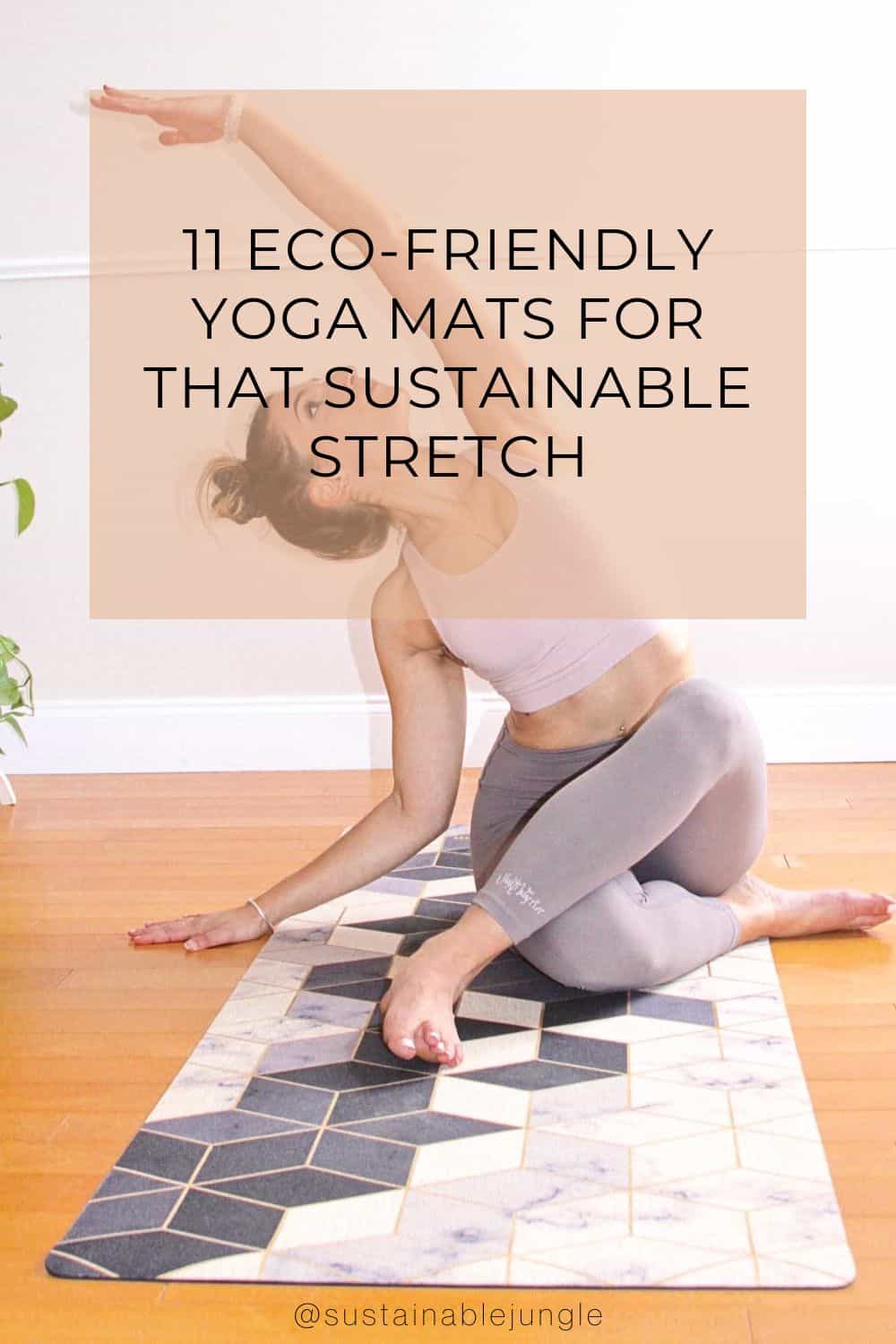
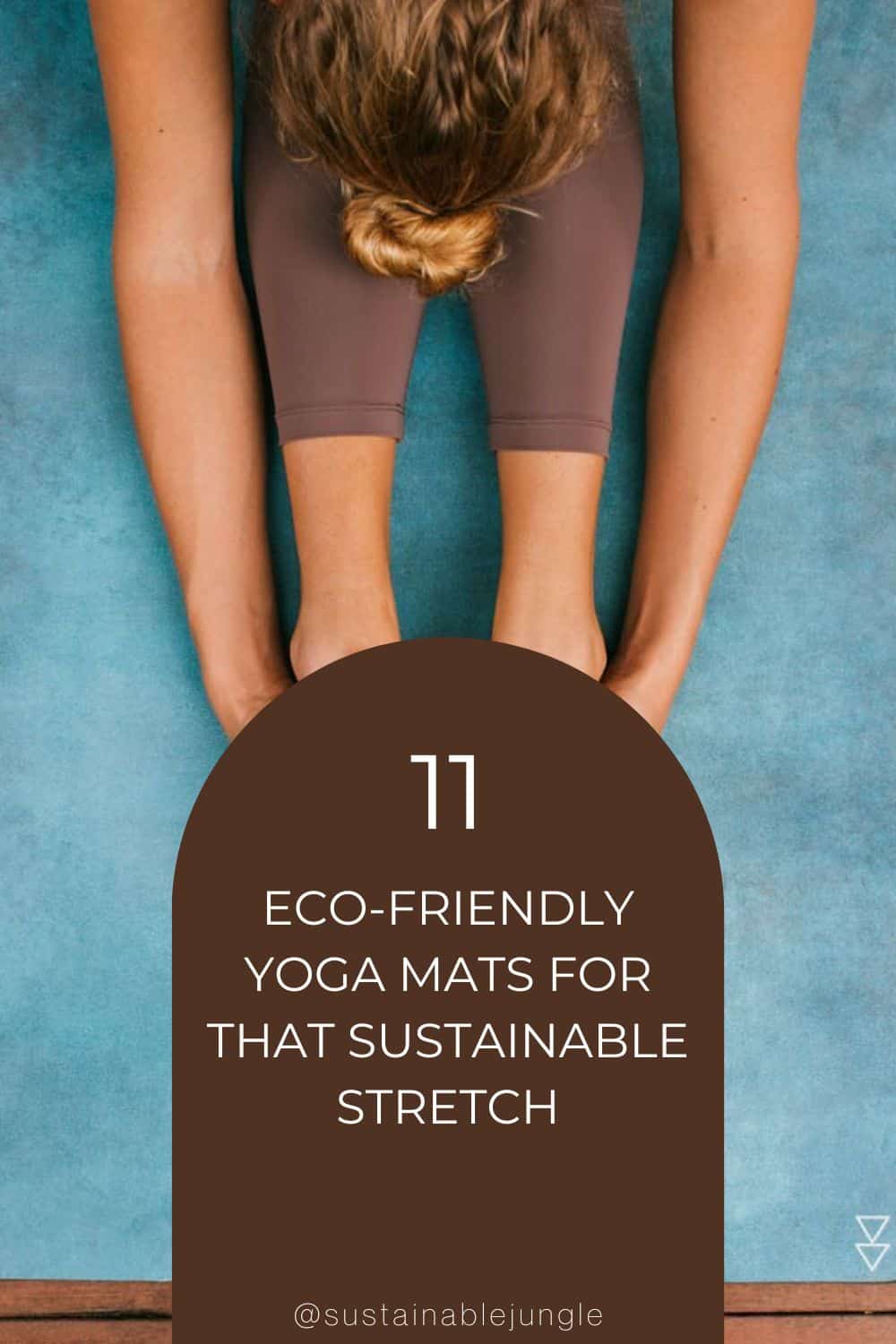

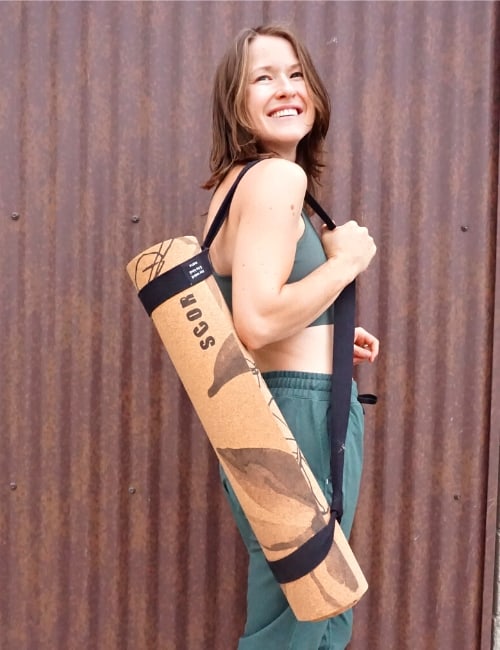

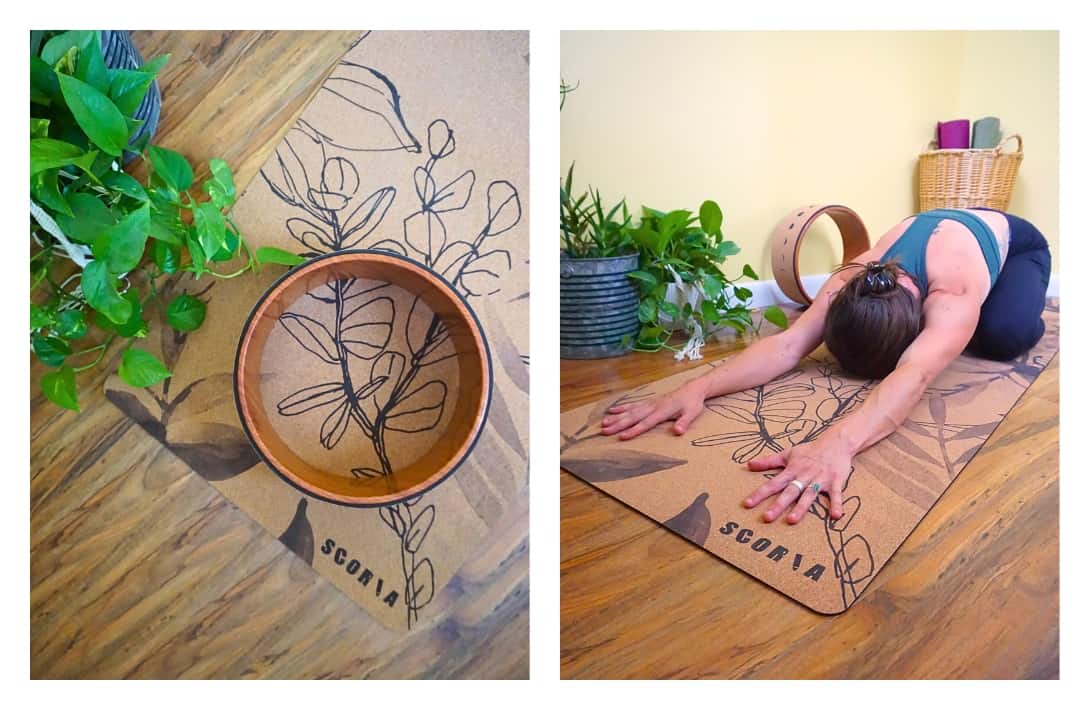
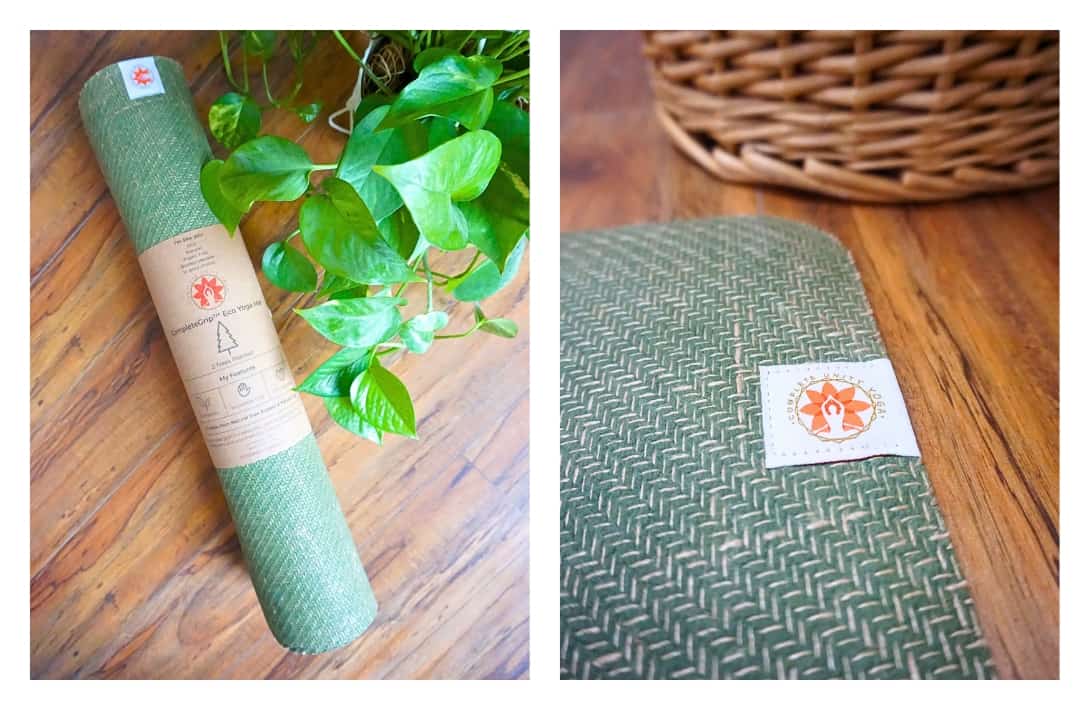
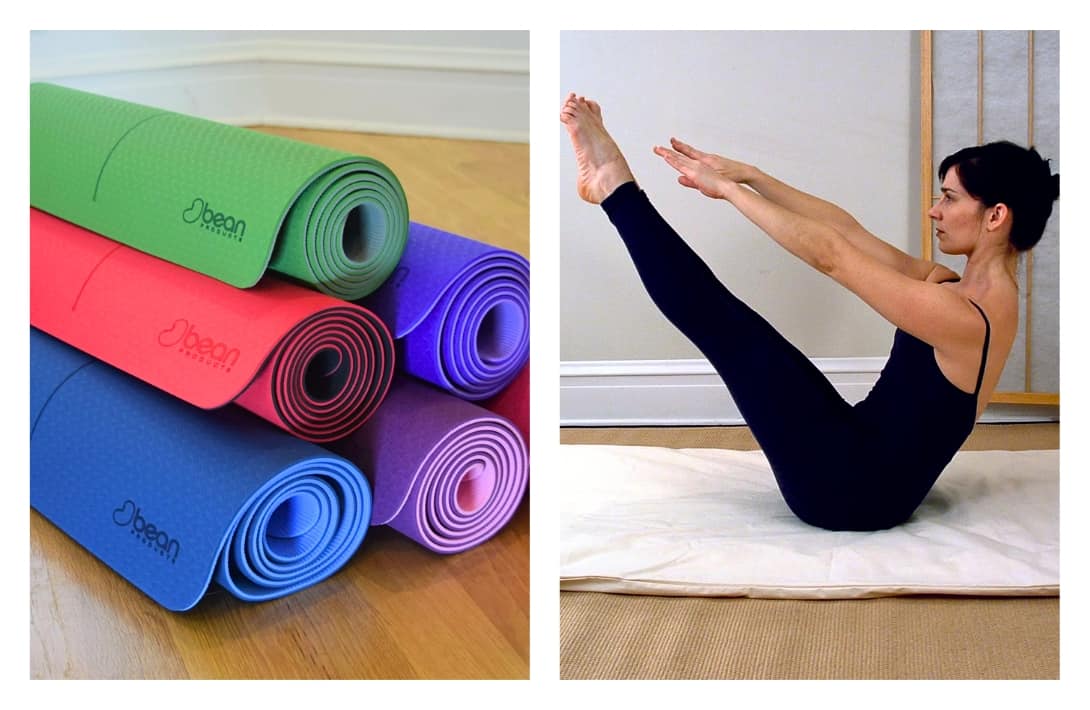
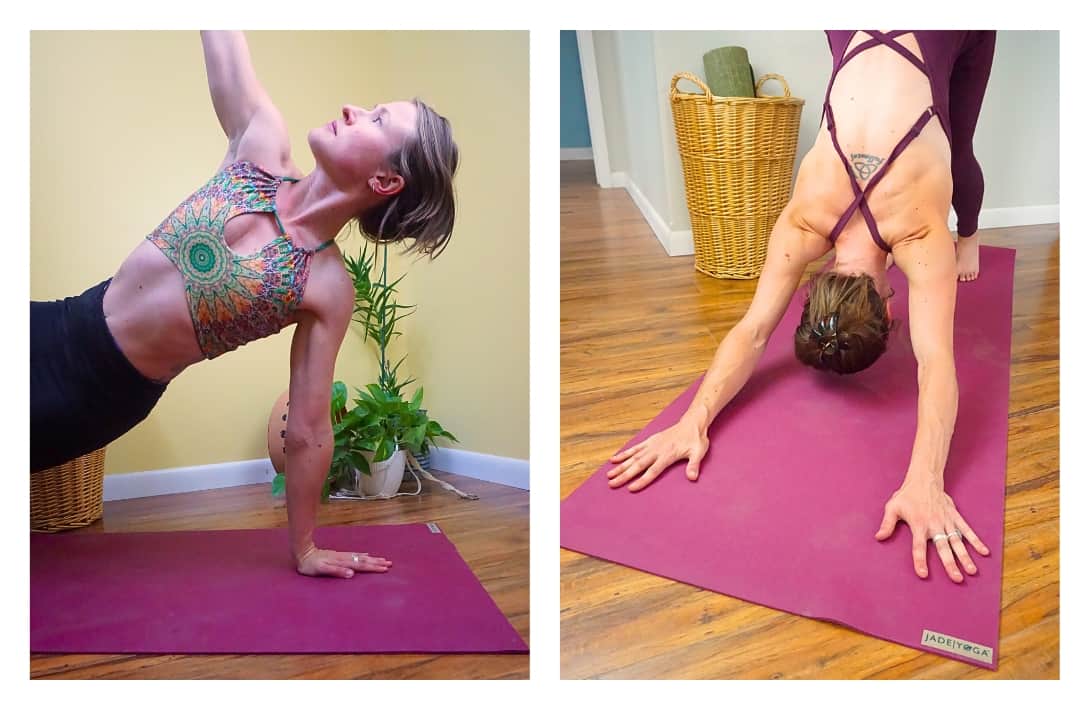
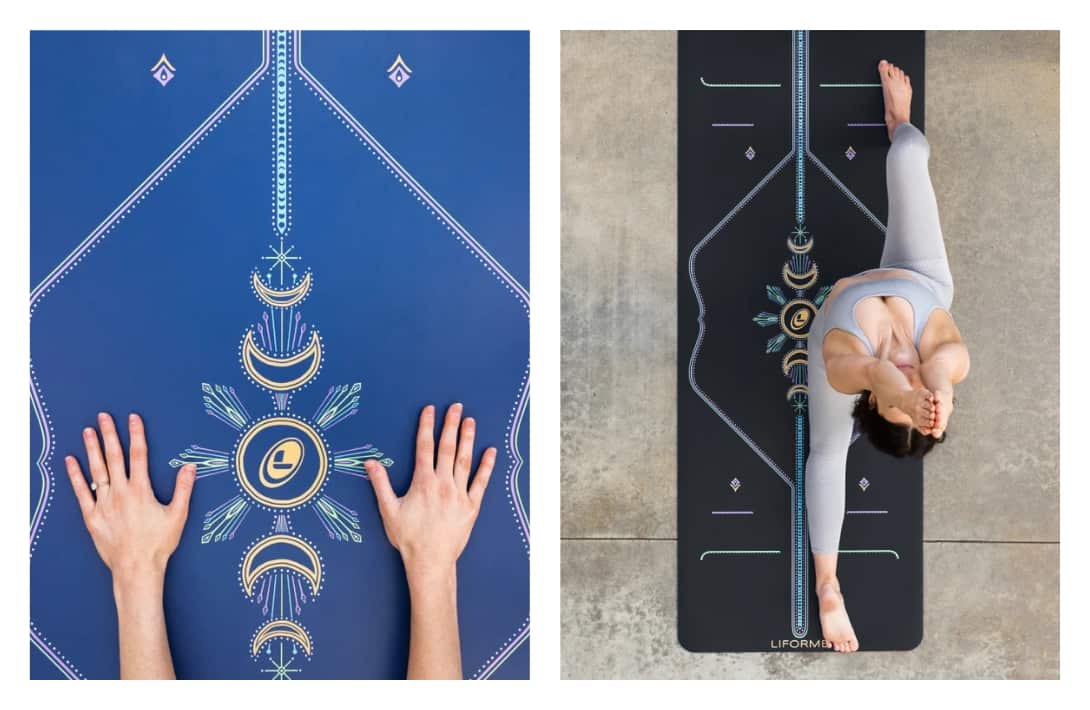
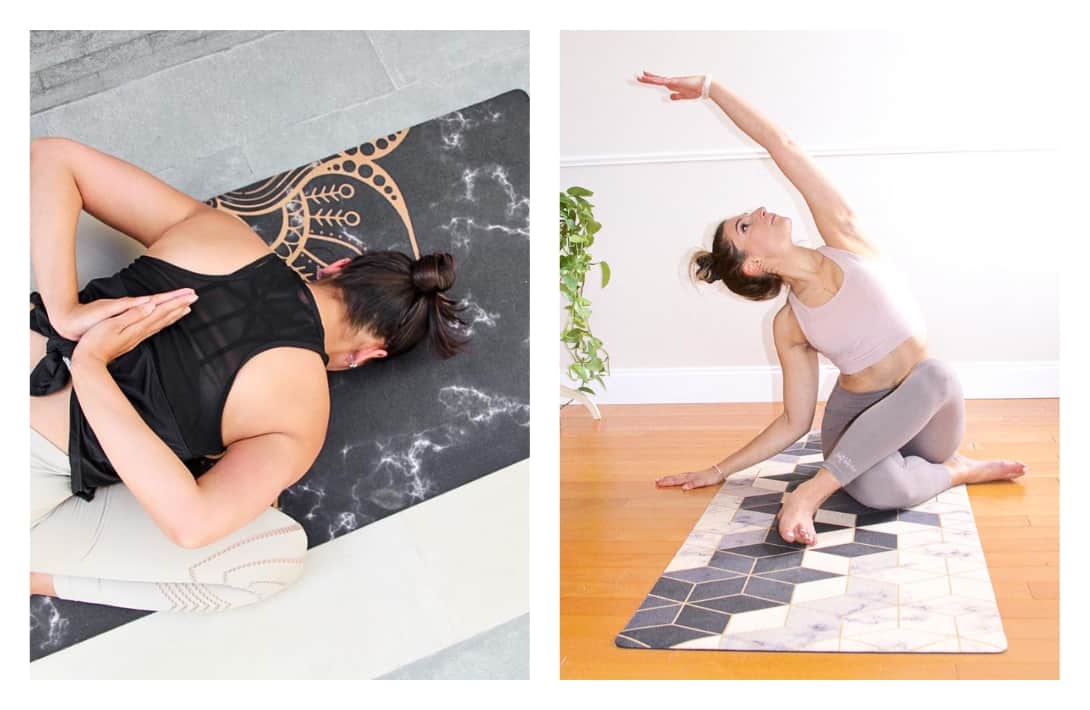
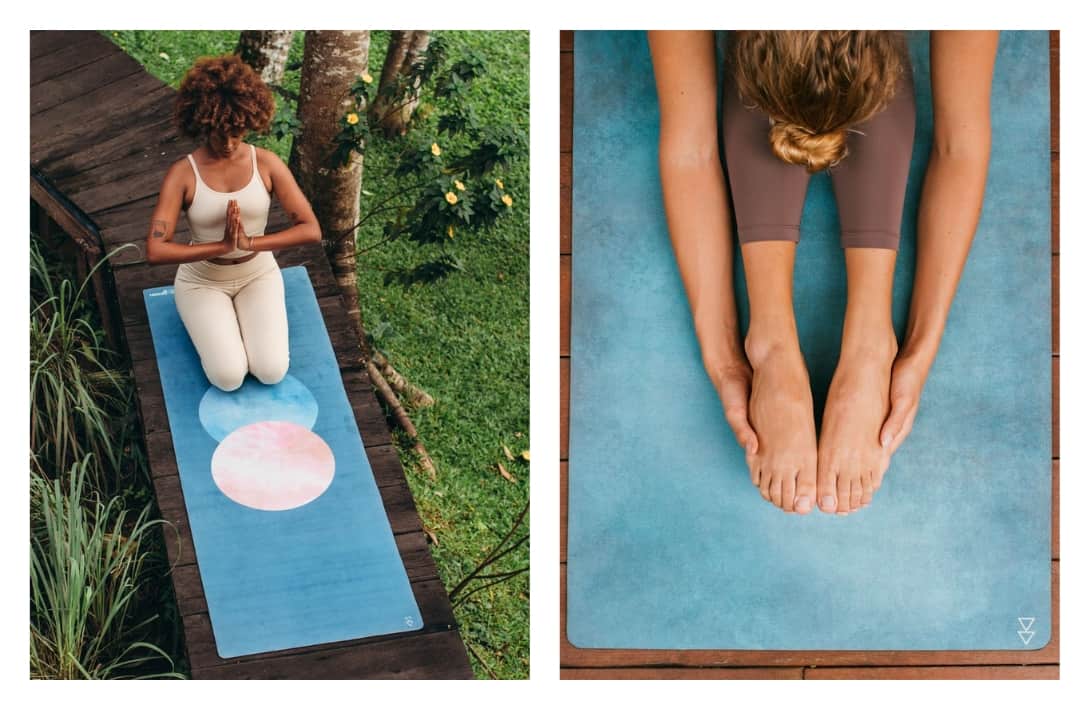
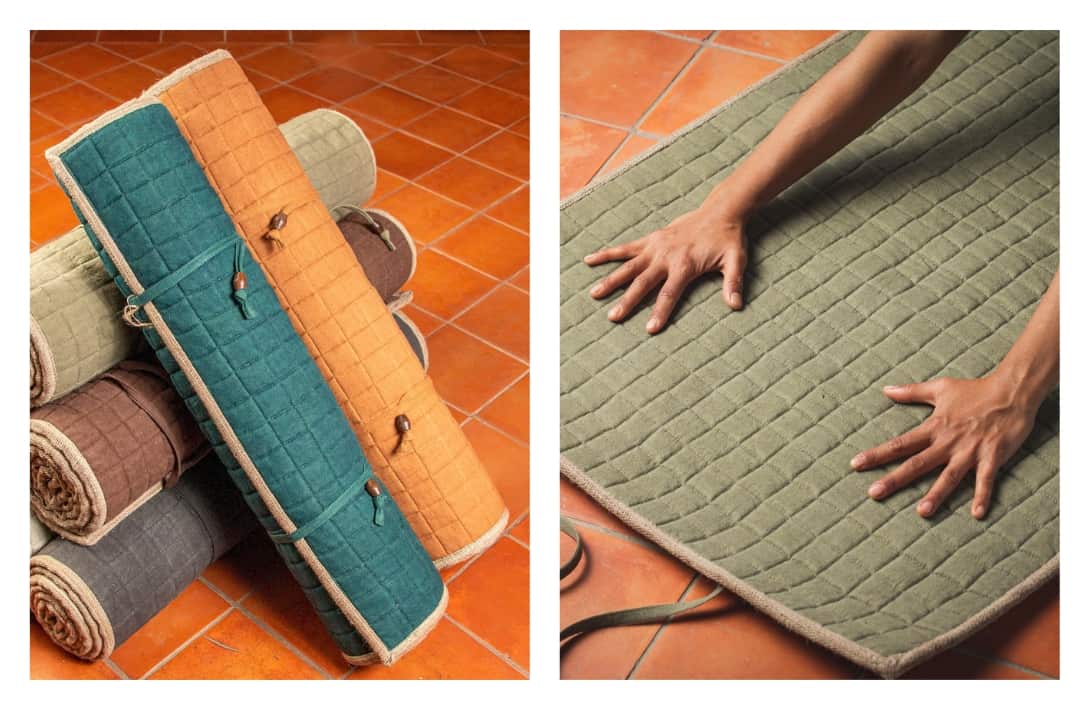
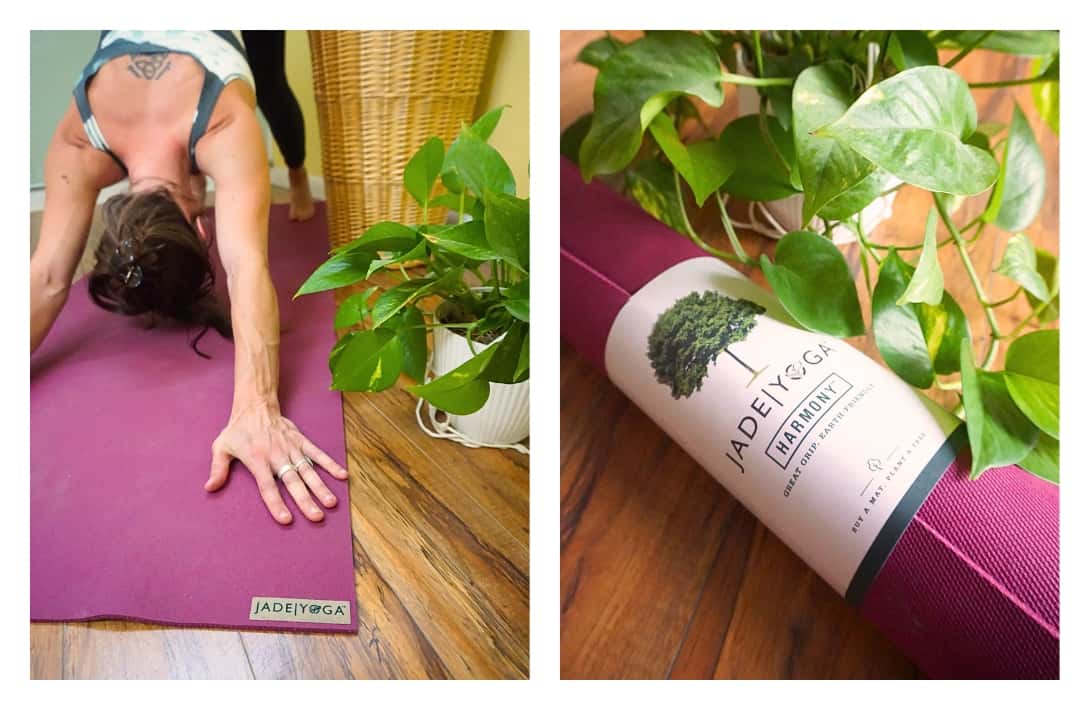
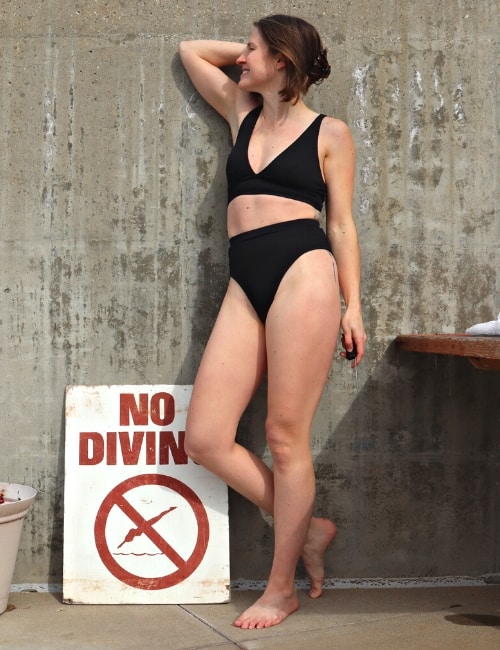


Great article! I was only familiar with Manduka from these five brands and buying an eco-friendly mat will definitely be something I’ll look at for my next purchase. One of the foundational principles in yoga is about non-harm – Ahimsa (https://elevatecalm.com/ahimsa/), which also involves not harming the environment. So I consider an eco-friendly yoga mat essential for every yogi!
Hi, if you are interested most of Yoloha’s mats are made with TPE, far away from this ECO sustainability and safety, here the link:
https://yolohayoga.com/inside-yoloha/about-cork-yoga-mats/
Good day
Great point, thanks Alejandro!
TPE is better than other materials, however. It will break down eventually and won’t off-gas harmful chemicals, like formaldehyde, like PVC mats will.